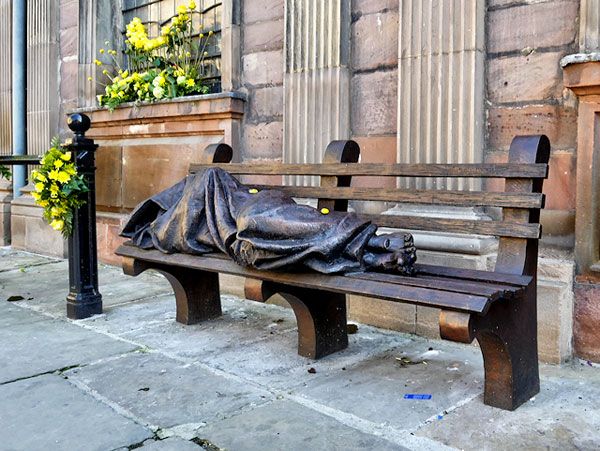
April 5, 2019; Curbed
The 9th Circuit Federal Court of Appeals, which covers nine western US states (California, Washington, Oregon, Hawaii, Alaska, Nevada, Arizona, Idaho, and Montana) has ruled that if there is no room at area shelters, then members of the public must be allowed to sleep without fear of arrest or prosecution.
The court in San Francisco denied en banc review (a full court) of a lower, three-panel member decision that held that prosecuting homeless persons who had no other places to go was cruel and unusual punishment and violated the Eighth Amendment of the US Constitution. The initial case came from an ordinance in Boise, Idaho, that bars sleeping on public property. These kinds of local ordinances have proliferated in the last decade but are now struck down in the covered states unless the US Supreme Court takes up the case.
In an interview shortly after this ruling, Eve Garrow, a homelessness policy analyst and advocate for the American Civil Liberties Union (ACLU), said:
This is such an important ruling. These enforcement actions punished people for unavoidable behavior. You can’t punish people for eventually falling asleep. It sends a message that people have choices, and that we don’t need to build any more supportive housing, and we don’t have any options. From a public policy perspective, they don’t make sense, they send the wrong message, they treat those who are poor as criminals, and create fear and mistrust of those experiencing homelessness.
Sign up for our free newsletters
Subscribe to NPQ's newsletters to have our top stories delivered directly to your inbox.
By signing up, you agree to our privacy policy and terms of use, and to receive messages from NPQ and our partners.
As Patrick Sisson writes for Curbed, “The Martin case will change enforcement around homelessness. If a municipality builds enough shelter spots that are truly, reasonable, accessible alternatives for everyone experiencing homelessness in their jurisdiction, it wouldn’t be prohibited from enforcing laws against sleeping in public.”
But, even in Boise, resistance remains despite the ruling; the city government issued the following statement after the Circuit Court Appeal ruling:
Today’s ruling does not mean the city ordinances are [unconstitutional], it simply has the effect of forcing the matter to be litigated further. Therefore, the city’s camping and disorderly conduct ordinances remain in effect until further clarification can be obtained from the courts; the ruling will not cause us to change our procedures.
—Carole Levine












